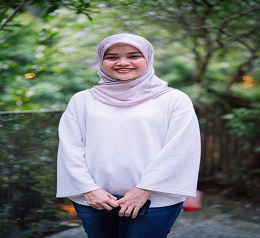4th Global
Women’s Empowerment & Leadership Summit
THEME: "Break Barriers, Build Futures"
 27-28 Oct 2025
27-28 Oct 2025  Bali, Indonesia
Bali, Indonesia THEME: "Break Barriers, Build Futures"
 27-28 Oct 2025
27-28 Oct 2025  Bali, Indonesia
Bali, Indonesia 
Selangor Women Empowerment Agency, Malaysia
Title: Family-Friendly Work Practices in Selangor: Action Study on Flexible Working Arrangement and Shared Parental Leave for Talent Retention
Rusni
Tajari serves as a Senior Manager at the Selangor Women's Empowerment Agency in
Malaysia, where she leads the formation of key initiatives like the Selangor
Women's Policy and Action Plan 2024-2026 and the Selangor Care Economy Policy
2024-2030. She has extensive experience in public policy, program management,
advocacy, and research, collaborating with a wide range of stakeholders
including government officials, civil society organizations, and the private
sector. Throughout her career, she has made significant contributions to
research, policy advocacy, and community development across all levels of
government. Her work is focused on crucial themes like good governance, women's
empowerment, and gender equality. Rusni is known for her insightful analysis
and commentary, which she shares through policy briefs, press statements, and
parliamentary engagements. Her passion lies in the fields of gender and
development, women's empowerment and leadership, human rights and democracy,
and various socio-economic issues.
This study investigates the implementation of family-friendly employment practices in Selangor, focusing on flexible work arrangement and shared parental leave as strategies for talent retention. While Malaysia has made significant legislative progress such as extending maternity leave to 98 days and 7 days for paternity leave, the uptake of flexible arrangements remains uneven, and gender-based disparities persist.
Using a mixed-methods design, the research combined a survey of 165 employees from Selangor state-owned companies with focus group discussions involving management and staff. Findings show strong support for flexible work arrangement, with nearly 80% of respondents linking them directly to job satisfaction, productivity, and mental health. Similarly, 74% agreed that shared parental leave is critical for workplace gender equality, though cultural norms still constrain its acceptance.
The thematic and sentiment analyses highlighted challenges such as inconsistent implementation, managerial discretion, and lingering stereotypes about gender roles. Nonetheless, employees overwhelmingly viewed family-friendly policies as essential for work-life balance, fairness, and long-term retention.
The report concludes with several policy recommendations: standardizing flexible work arrangements across agencies, extending shared parental leave to normalize caregiving responsibilities, shifting performance evaluations towards output-based measures, and expanding childcare support. Together, these reforms can strengthen gender equity, organizational trust, and competitiveness, positioning Selangor as a leader in inclusive and sustainable employment practices.